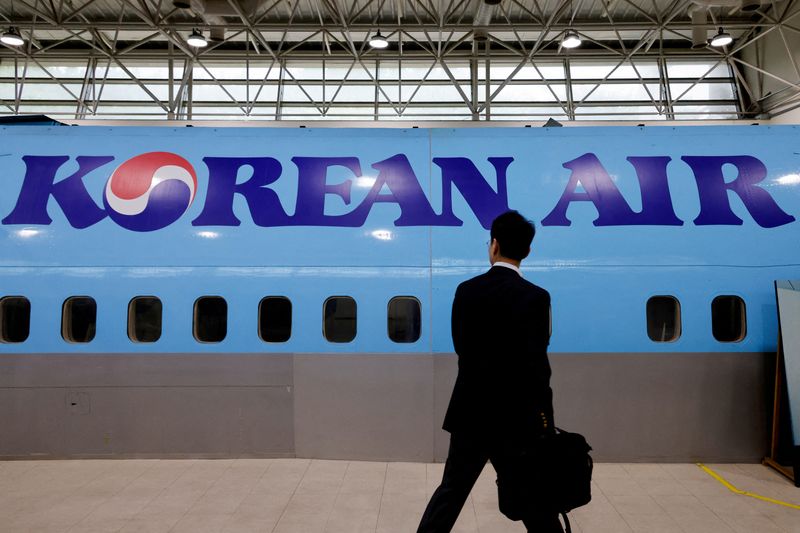By Lisa Barrington
SEOUL (Reuters) -South Korea will support smaller airlines and monitor market competitiveness after dominant carrier Korean Air completed a $1.3 billion acquisition of Asiana Airlines on Thursday to create one of Asia's biggest carriers. Korean Air acquired a 63.88% stake in the country's second-largest airline, making it a subsidiary three years later than Asiana had initially anticipated. The enlarged Korean Air group could account for just over half of South Korea's passenger capacity, and would become the world's 12th-largest airline by international capacity, a Reuters analysis of airline data from Cirium and OAG shows.
It would rank alongside China's top three state-owned carriers as one of the Asia-Pacific region's largest by revenue, according to 2023 financial results.
South Korea's transport ministry unveiled measures on Wednesday to boost competitiveness in the domestic aviation industry, such as additional medium- and long-haul traffic rights for low-cost carriers, the Yonhap news agency said.
By March, the Fair Trade Commission (FTC) intends to set up a panel to monitor Korean Air's compliance with conditions attached to the merger's approval, which it finalised on Wednesday.
The conditions include a pledge by Korean Air not to let seat numbers fall below 90% of 2019 levels on key routes, an FTC document showed.
Korean Air said there would not be staff layoffs.
"The combined organisation projects natural staff growth through business expansion, with employees in overlapping functions being reassigned within the organisation," it said in a statement.
The acquisition was hampered by competition concerns. Korean Air had to make significant concessions around the world, including handing routes to other airlines and selling Asiana's cargo operations, in order to complete the deal.
It is the longest-ever merger of airlines to be completed, and was first announced in Nov. 2020 to rescue debt-laden Asiana, which was grappling with a plunge in demand during the COVID-19 pandemic.
Asiana will be run as a subsidiary for up to two years before integrating into one airline that retains the Korean Air name, but with new branding.
Korean Air will also create a single low-cost carrier and its integration strategy includes spreading out flight schedules on overlapping routes, adding new destinations and more safety investments, it said.
A plan to merge the two airlines' frequent flyer programmes will be submitted to the FTC by June 2025 for review, Korean Air said, adding that the merger would strengthen its competitive position globally.
The airline said the deal aims to boost the capabilities and network reach of Incheon International Airport, the world's fourth-busiest for international flights and fifth-busiest for cargo, which competes with Asian hubs Hong Kong and Singapore.

Airline consolidation is rarer in Asia than in Europe, which has seen a wave of mergers in the last two decades, and in North America where regulators fear the industry is too concentrated.
Asiana will hold an extraordinary general meeting of shareholders on Jan. 16 to appoint new board directors nominated by Korean Air.